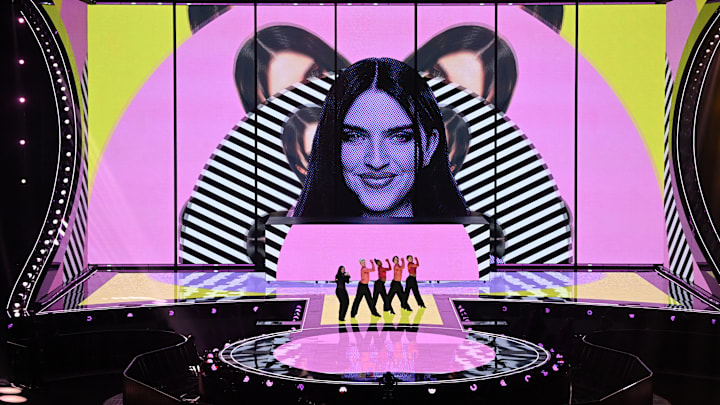The Eurovision Song Contest—commonly known as ESC or just Eurovision—started in 1956 and has since become the world’s biggest talent show. Catch up on the facts about one of the most popular televised events in Europe, which is known just as much for its kitschy antics as the actual music.
1. Eurovision has classical roots.
When Eurovision first aired, only solo artists were permitted to compete, and each artist was accompanied by a 24-piece orchestra led by Fernando Paggi—a far cry from the very pop music-centric showcase the ESC is today.
2. Eurovision started with the Swiss.
Switzerland won the very first Eurovision competition, and it hosted the event too. (Suspicious? Possibly.) Swiss singer Lys Assia took home the glory with the French-language song “Refrain.” Some of the weirder-sounding runners-up from that year included Belgium’s entry, "Messieurs les noyés de la Seine" ("The Drowned Gentlemen of the Seine") and Germany’s "Im Wartesaal Zum Großen Glück" ("In The Good Luck Waiting Room").
3. According to Eurovision rules, no songs can be over three minutes—and no animals are allowed on stage.
The official rules to compete in the Eurovision Song Contest change regularly, but some include: no songs over three minutes; no previously commercially released songs (i.e., no covers!); no more than six people on stage at once; and no live animals. In 1990, it was decreed that all performers must be over the age of 16, which makes Belgian singer Sandra Kim, who was 13 in 1986 when she took home the prize, forever locked in as history’s youngest Eurovision winner.
4. Winning Eurovision comes with responsibilities.
Typically, the country that wins each year’s Eurovision must host the competition the following year. But in 2022, Ukraine—which is currently at war with Russia—took home the top prize, so 2023’s contest is being held in Liverpool, England. “The city is synonymous with music and Liverpool Arena exceeds all the requirements needed to stage a global event of this scale,” Eurovision Song Contest Executive Supervisor Martin Österdahl said in a press release in October 2022. “We have been very impressed with the passion the city has shown in embracing the Contest and their inclusive ideas for placing last year’s winners, Ukraine, front and centre when thousands of fans visit next May.”
5. The Eurovision fun isn’t always restricted to Europe.
Australia competed in 2015 in what was supposed to be a one-time celebration of the contest’s 60th anniversary and a nod to that year’s theme, “Building Bridges.” But the country ended up competing in every Eurovision since.
6. One Eurovision winner became an MP in Ukrainian parliament.
Ukraine’s 2004 entrant, Ruslana, brought home a victory for the former Soviet republic, and its singer was subsequently awarded a seat as an MP in the country’s parliament a few years later. One of the most successful recording artists in Ukraine’s history, Ruslana—a pianist, singer, and actress—was later nominated as “the Hero of Ukraine”; she also served as the country’s UNICEF Goodwill Ambassador.
7. Second at Eurovision equals last, apparently.
No Eurovision winner has ever performed second on the roster—it’s called “Curse of Number Two.” So if you’re up second, you’re not winning, or so it seems.
8. Eurovision uses a lot of lights.
In 2009, the set for the Eurovision finale in Moscow used 30 percent of the world’s supply of LED screens, according to the BBC. It also included an interval show that featured Russian pop duet t.A.T.u. performing with the Red Army Choir—and a bright pink military tank.
9. Ireland is a big Eurovision winner.
Ireland is the winningest country (so far), with seven total wins. Next up is Sweden with six wins, then Luxembourg, France, the Netherlands, and the United Kingdom with five wins each.
10. Norway is not a big Eurovision winner.
Ranking at the top of the list of the world’s most developed countries, Norway generally doesn’t have much to pity itself about, but you might feel sorry for them in light of their consistently and spectacularly low Eurovision scores. The Scandinavian nation has come in dead last on 11 separate occasions, and it’s scored null (negative) points not once but four times. (Their 1980 entry was a protest song about a hydroelectric power station, so ... maybe they deserved it a little.) They have won three times, though.
A version of this story ran in 2016; it has been updated for 2023.
